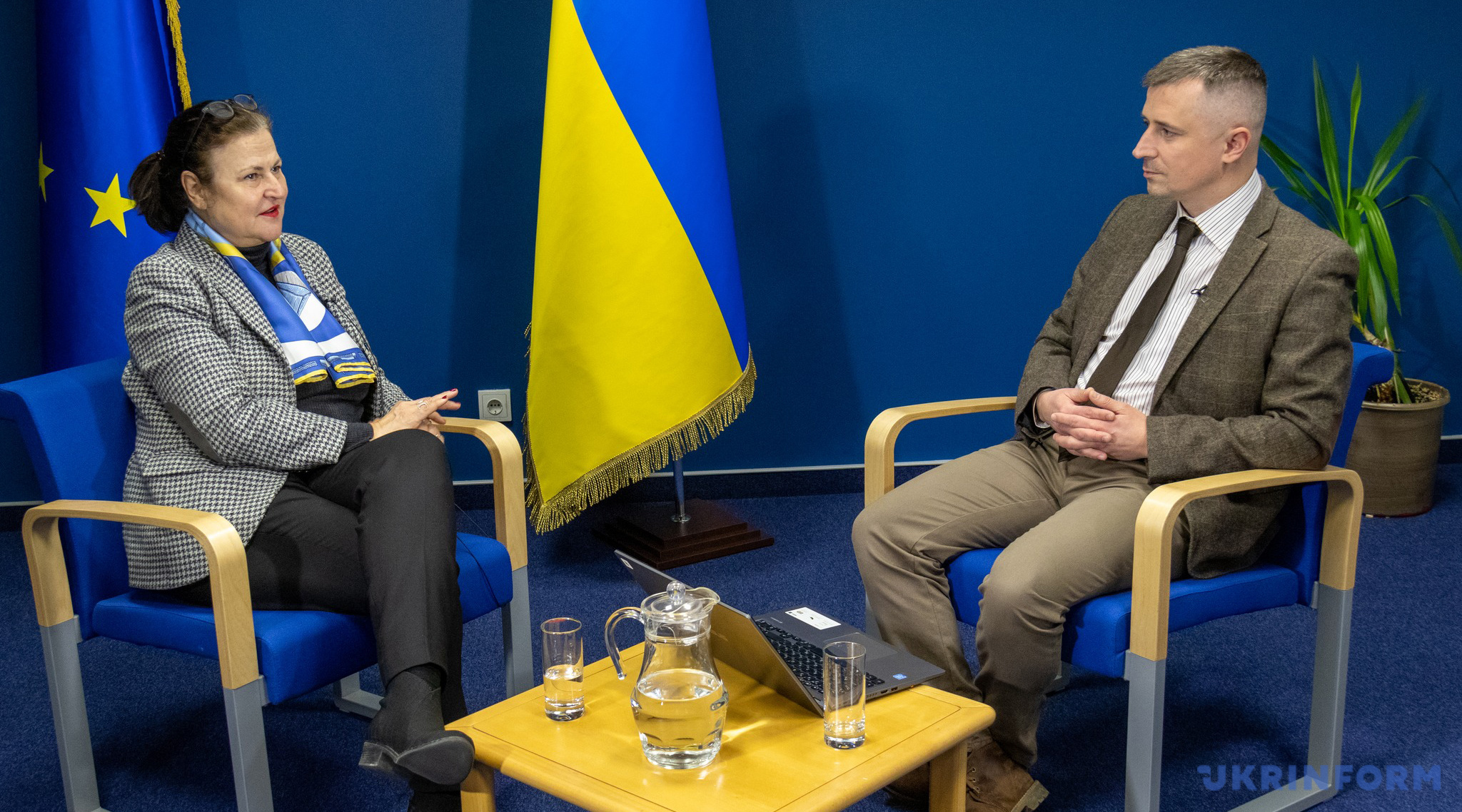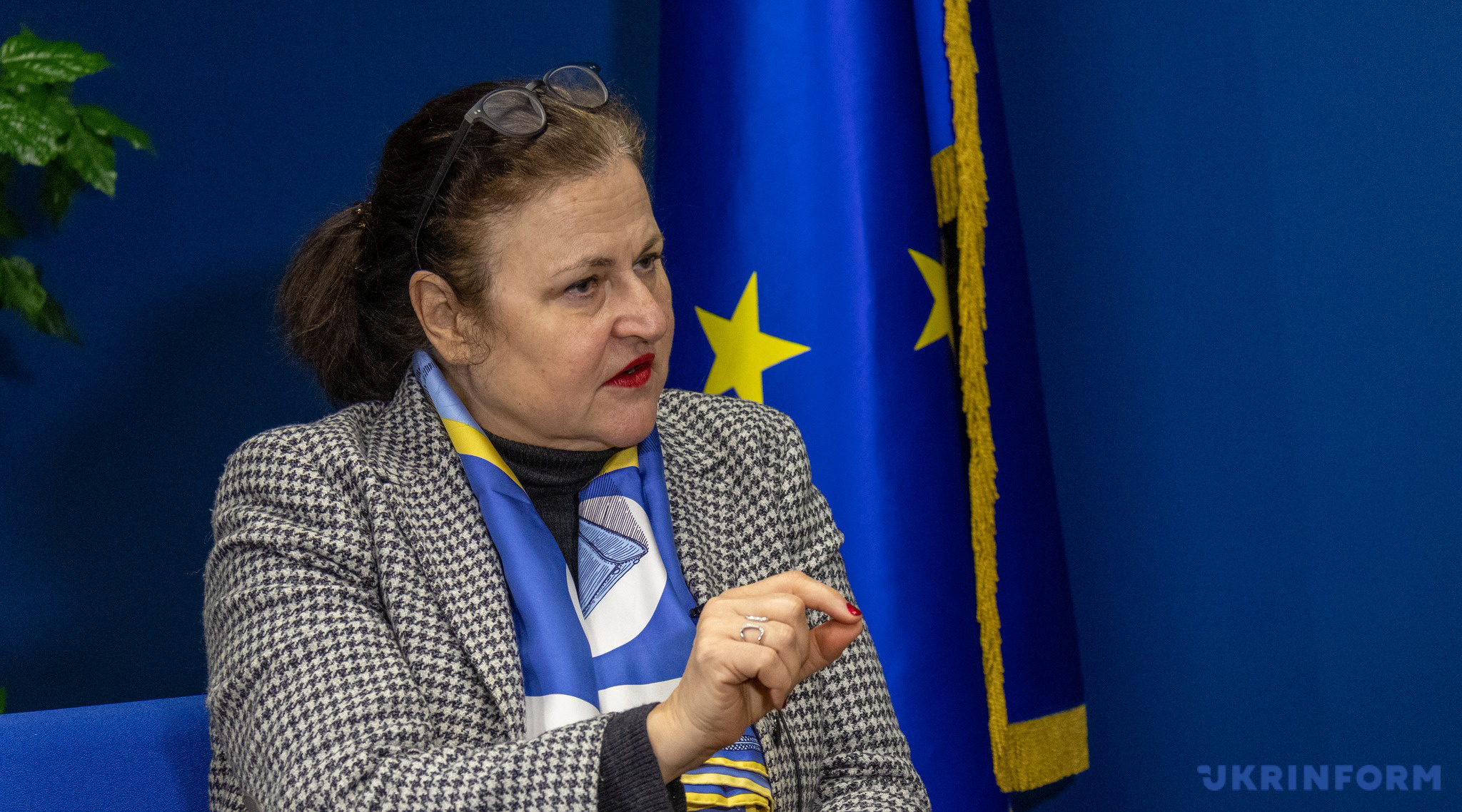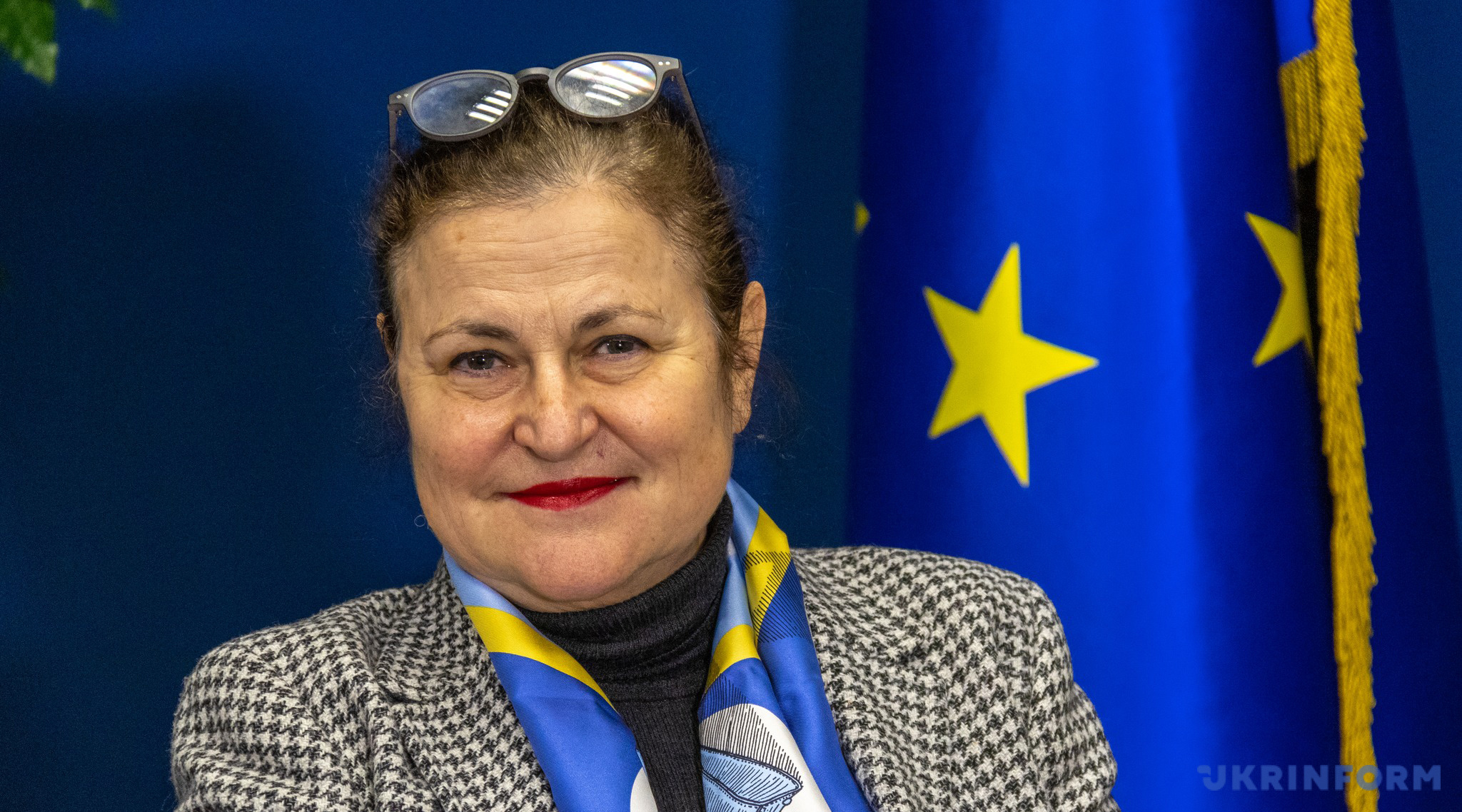On the day when all 27 leaders of EU member states agreed to set up the Ukraine Facility in the amount of EUR 50 billion for the next four years, EU Ambassador to Ukraine Katarina Mathernova shared with Ukrinform her impressions of this landmark event, spoke about the details of the expected extension of trade preferences for Ukrainian products on the European market, the reasons behind the long discussions surrounding the use of frozen Russian assets, collective measures to deter Russian aggression and strengthen the EU defense potential, and more.

EUR 50 BILLION: IT'S REALLY A VERY BIG AMOUNT, ESPECIALLY FOR A NON-EU COUNTRY
- Good evening, thank you for doing this interview with us on this historic day, a big day. Congratulations on your extensive efforts and contribution to this end.
- Thank you very much and congratulations to you over this unwavering support that the EU and its leaders have shown today to Ukraine. So congratulations to you.
- Thanks. That's a big event and a big decision by EU leaders. Hungary’s veto has finally been lifted after such a lengthy discussion that had been going on for quite a while on the Ukraine Facility that lays down EUR 50 billion for Ukraine for the next four years. Was the debate dragging for so long because of unity issues or perhaps it was all about this big amount? How burdensome for the EU is to allocate this huge batch for Ukraine?
- I think this is an extra effort by the European Union for Ukraine. And in fact, the EUR 50 billion for Ukraine represents the vast majority of the money that has been agreed upon. It was part of a broader package that was agreed, but the EUR 50 billion was the biggest single chunk. It's going to consist of two-thirds borrowing and one-third grants, so 33/17 billion split. And compared to the EU GDP or even to the multi-annual European budget is not that big an amount but it's really a very big amount, especially for a third country. So I think this is an important effort and very much a demonstration of the support and long-term commitment to Ukraine as a future EU member state that the EU has shown today.
UKRAINIAN AGRICULTURAL PRODUCTS IN THE EU: SAFEGUARDS ONLY COVER THREE PRODUCTS
- Another important issue that we see positive progress on is trade liberaliazation extension for Ukraine. The draft agreement on trade preferences between Ukraine and the EU, which the Commission proposes to extend until 2025, lays down reinforced safeguards regarding certain agricultural products. They can 0be activated by any EU member state in case significant fluctuations are observed on the market. Do you think all that remains for Ukraine is to agree to this situation or do you think maybe Kyiv has options to protect our national interests in this regard?
- First, I would say that when you talk about national interest, the opening of European markets to Ukrainian products is a unilateral move that has been made in response to the full-scale invasion in 2022 and was extended last year. We are now talking about another extension. And this is the basis of your economic lifeline. This is why you were able, even in the situation of war, thanks to the Solidarity Lanes and thanks to the Black Sea Trade Route, to bring your export levels to pre-war ones.
So we are continuing, we are proposing to continue to open markets of the European Union to Ukraine. Yes, there is an automatic safeguards clause, but it's not for all agriculture products. It only covers three products and it's going to kick in when individual member states are able to demonstrate harm to their own producers. But the level of the safeguard is at the average of 2022/2023 imports. So it's not a ban. There is a quantitative limit. But I think, what is most important in the proposal, which still needs to be approved because this is just a proposal by the European Commission, is it is about continuing, keeping European markets largely open to Ukrainian products.

- Speaking about the lifeline, another major contribution to the economy of Ukraine would be money from Russian frozen assets located in the EU. Permanent representatives of the European Union countries at the meeting on January 29 agreed to create a separate account to which interest from the taxable profits derived from frozen Russian assets will be transferred. Who will manage this account and when can we expect this money to be transferred to Ukraine?
- You're right that at the end of January, one of the decision-making bodies in our fairly complex and lengthy decision-making process approved it. This was the meeting of the Ambassadors of the European Union, they are called permanent representatives. So that's part of the decision-making. It still needs to go through the full legislative process. It still needs to be approved European Parliament and it needs to be approved by the member states. So I think that it is a little bit premature to talk about who is going to manage the account. But this shows you that there is an active discussion on how to get the economic benefit from the frozen assets, because everybody agrees with Ukraine on the notion that Russia should pay for all the devastation and destruction that it's causing Ukraine. And this would be one step towards that direction. So it's moving, it's not been easy because it's a legally complex issue. So there has been a lot of hesitation.
There is also a track in the G7 where there is a discussion of the same issue, about confiscating the totality of the Russian frozen assets. But these are things that are moving a little bit slowly because, you know, when you put a lot of lawyers at one table things don't move very fast but I think things are moving in the right direction.
SECURITY GUARANTEES: THERE WILL BE MORE BILATERAL AGREEMENTS SIMILAR TO THOSE UKRAINE SIGNED WITH UK
- The EU is helping Ukraine that is already at war. And now we see that many European politicians and military officials are voicing publicly that Russia might actually attack Europe as well. It will not stop at Ukraine if it prevails. So we see that some of EU member states already taking measures to prepare for any contingency in the future, by ramping up their defense budgets and arms production. Should the EU offer a joint response to this threat? What deterrence should be put forward at this point of time?
- I think what we are seeing - and there was also very clear language in the conclusions of the summit today - that EU leaders are very much talking about the need to strengthen the military support and strengthen the defense production, to both boost domestic production and domestic deterrence.
But in the first place, to help with the Ukrainian war effort. So there is discussion on needing to boost the production in Europe, create various joint initiatives and continue supporting the Ukrainian war effort militarily and financially. So this is something that's very much an active debate.
It's going to be discussed at the next summit as well. And what is happening in the meantime is active discussion between Ukrainian representatives and individual member states on the security guarantees. And as part of the security guarantees, there's also discussion of increasing the production of artillery and production of drones, as well as supplies of the much-needed air defense, etc.
I believe that your representatives are in European capitals these days actually negotiating more and more of these bilateral agreements as well, the ones that started with the UK and then others are coming.

PRIORITY CLUSTER OF ACCESSION NEGOTIATIONS: FUNDAMENTALS OF A STRONG DEMOCRACY AND STATE
- The European Commission will approve the framework for accession negotiations, after confirming the full implementation of EU recommendations by Ukraine.
- Well, the European Commission will propose and it's for the member states to approve because the negotiating framework is essentially a negotiating mandate that the member states extend to the European Commission that will be the one that negotiates the accession of Ukraine.
- So we expect that this might happen in spring. At the same time, Europeans will elect a new European Parliament in June, and then approve all high-ranking officials. Can we expect, in the case of a positive assessment in spring, that negotiations with Ukraine will begin under the current composition of the European Commission?
- I very much hope so. It's going to depend on the assessment of fulfilling the criteria, and there is still some work to do on the Ukrainian side. And of course, as every step of the enlargement process, accession to the EU is subject to unanimity, just like was the financing package. So I truly believe and I hope that we will be able to reach that in the spring around European Council in March, ahead of the European elections in June. But we will only know the answer in March.
- These negotiations provide for a dialogue and agreement on each of the 35 sections, or tracks.
- Chapters.
- Yes, chapters which cover pretty much all spheres. Will this process launch at once for all those Chapters or are there any priorities laid down?
- Actually, the chapters are divided into six clusters. And the chapter that gets opened first, which is the basis for actually being able to finalize the agreement, is so-called fundamentals where you have a lot of questions of basic democratic values and freedoms, rule of law, anti-corruption, fight against organized crime… These are sort of the fundamentals of a strong democracy and state.
And that is one of the reasons why there has been so much emphasis from us, traditionally put on these areas over the years. And that's why you have seen a prevalence of these types of issues, both in the seven steps from 2022 and four remaining steps that have been outlined in December when Ukraine received the green light together with Moldova for opening accession negotiations.

SANCTIONS AGAINST RUSSIA: THE EU IS WORKING TO PREVENT THEM FROM BEING CIRCUMVENTED
- Well, the last one but not the least, the question of sanctions. Russia sanctions. We know that the discussions are ongoing around the 13th package of EU sanctions. Can you at all elaborate on this process or is it totally behind closed doors?
- Yes, the discussions are ongoing, that's not a secret. But I think what we have increasingly been putting emphasis on is actually making sure that the previous packages get implemented. That was a big part of the 12th package – also making sure that whatever was discussed and decided before actually gets done.
The EU has named David O’Sullivan, as the sanctions coordinator who, in fact, travels around the world and works with third countries to incentivize them and police the sanctions so they actually get implemented and you don't have circumvention of sanctions.
So, in parallel to discussions on the 13th package is also work underway to make sure that the existing sanctions don't get circumvented because we all know and all read newspapers and reports how a lot of the production that Russia has, including in the military field, has components that they received in circumvention of our sanctions. So that's a big portion of what needs to be paid attention to.
- Thank you very much for doing this interview with us on this big historic day, and I hope we'll be hearing more pleasant news coming from Brussels this year.
- Thank you very much. Slava Ukraini! (Glory to Ukraine – ed.)
- Heroiam Slava! (Glory to the heroes – ed.)
Ievgen Matiushenko
Photo: Pavlo Bahmut
